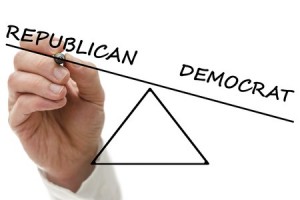 Why do today’s Democrats do so much better than Republicans at the polls? Their supporters say because their programs are more responsive to citizens’ needs. More objective analysts say because they do a better job of getting out the vote. David Horowitz offers a very different and I believe more insightful argument in his pamphlet Go for the Heart.
Why do today’s Democrats do so much better than Republicans at the polls? Their supporters say because their programs are more responsive to citizens’ needs. More objective analysts say because they do a better job of getting out the vote. David Horowitz offers a very different and I believe more insightful argument in his pamphlet Go for the Heart.
Horowitz, whose parents were communists, was a liberal activist in his youth but then renounced leftist philosophy for conservatism. In his pamphlet he explains that Democrats win elections because rather than making logical arguments, as Republicans strive to do, they appeal to voters’ emotions.
For example, Horowitz notes, Democrats speak of achieving “social justice” by making everyone pay his or her “fair share.” They say they want everyone to have “affordable health care,” a quality education, and a well-paying job. At the same time, they depict Republicans as being against everything good and decent. They say Republicans want to make the rich richer at the expense of the poor, deprive women and minorities of their rights, weaken education, and consign the elderly to a wretched existence. In short, Democrats “see Republicans as enemies of the just and good—as evil.”
The central theme for Democrats in any election, Horowitz believes, is caring. Their strategy is to repeat again and again, in every form and venue, Democrats care about people, Republicans don’t. If voters hear it often enough, Democrats reason, they will believe it and vote accordingly.
In contrast, Horowitz finds the Republican response too meek, consisting mostly of saying Democrats are engaging in “class warfare” and being “divisive.” He laments Republicans’ reluctance to take a more forceful approach and to do so with passion. In his view there is more than enough evidence that Democrats’ approaches to welfare, education, immigration, and virtually every other challenge have failed miserably.
Horowitz concludes by urging Republicans to expose those failures and demonstrate that, far from being the champions of the poor and downtrodden, Democrats have exploited them and made their lives more difficult.
I find Horowitz’ argument insightful for two reasons. First, it accurately depicts the strategy Democrats have been pursuing for many years. They rely, as he notes, mostly on emotional appeals filled with grand phrases but lacking in specific details. In addition, whenever the shortcomings of their programs are pointed out, they refuse to answer the critics but instead engage in demonization and fear mongering.
The other reason I am impressed with Horowitz’ argument is that his recommendation to Republicans is well founded. Democrats have been much more alert to the cultural changes that have occurred in America over the last half century. They have realized, more fully than Republicans, that popular psychology has persuaded a great many Americans to trust emotion more than reason. And they are more aware than Republicans that the average person’s attention span has shrunk dramatically in recent decades.
In other words, Democrat politicians understand that the way to reach a majority of the public is to frame themselves as heroes and their opponents as villains, make appealing promises, create simplistic slogans, and repeat them over and over until the voters know them by heart.
With only six months left before the mid-term elections, the task confronting Republicans is formidable. They must become as proficient in exposing the Democrats’ record of failure as the Democrats are in demonizing them. They must learn to speak simply and clearly, with passion, and to keep their message focused and concise.
The lives of millions of people and perhaps the future of the country depend on whether they can meet the challenge.
Copyright © 2014 by Vincent Ryan Ruggiero. All rights reserved

